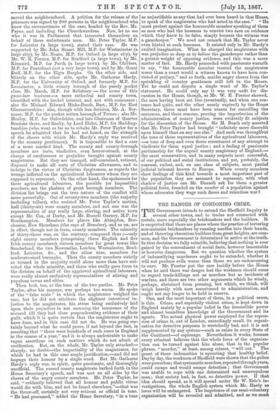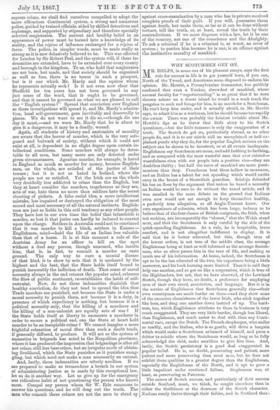THE DANGER OF CONDONING CRIME.
THE Government intends to extend the Sheffield Inquiry to several other towns, and to trades not connected with metals, more especially the brickmakers and the builders. It is suspected that there are places where the practice of torturing non-unionist brickmakers by running needles into their hands, and of throwing obnoxious builders from great heights, are com- mon, and the Government is determined to arrive at the truth. In that decision we fully coincide, believing that nothing is ever gained by the concealment of social facts, however lamentable or however dangerous. But we question whether the system of indemnifying murderers ought to be extended, whether it will not produce evils worse than those we are endeavouring to cure. Mr. Forster put the case lucidly before the House when he said there was danger lest the workmen should come to regard trade-killings not as murders but as incidents of warfare, and there are two other arguments which he wisely, perhaps, abstained from pressing, but which, we think, will weigh heavily with men accustomed to administration, and ought not any longer to be held in reserve. One, and the most important of them, in a political sense, is this. Crime, and especially violent crime, is kept down in England mainly by a popular belief in the irresistible power and almost boundless knowledge of the Government and its agents. The actual physical power employed for the repres- sion of crime is, out of London, exceedingly small, its organi- zation for detective purposes is wretchedly bad, and it is not supplemented by any system—such as exists in every State of the Continent—of espionage. Nevertheless it works, because every criminal believes that the whole force of the organiza- tion can be turned against him alone, that in the popular phrase, "murder;" at least, among crimes, " will out." The grant of these indemnities is uprooting that healthy belief. Day by day, the workmen of Sheffield were shown that the police were powerless ; that systematic murders, repeated through years, could escape and would escape detection ; that Government was unable to cope with one determined and unscrupulous man ; that society had, in fact, no detective power. If that idea should spread, as it will spread under Sir W. Erle's in- vestigations, the whole English system which Mr. Hardy so loves will be endangered. The impotence of our semi-voluntary organization will be revealed and admitted, and as we must repress crime, we shall find ourselves compelled to adopt the more efficacious Continental system, a strong and numerous police, guided by trained officials, aided by skilled detectives and espionage, and supported by stipendiary and therefore specially selected magistrates. The ancient and healthy belief in an appearance of power must be turned into a knowledge of its reality, and the regime of influence exchanged for a regime of force. The police, in simpler words, must be made really as strong &sit is now delusively believed to be. This was effected for London by Sir Robert Peel, and the system will, if these in- demnities are extended, have to be extended over every county and borough in the kingdom. To us, who hold that magistrates are not born, but made, and that society should be organized as well as free, there is no terror in such a prospect, but is it one which Mr. Hardy and the squires whom he represents actually seek ? Is it not even now clear that Sheffield for ten years has not been governed in any just sense of the word, that it ought to be governed, and that it cannot be governed on what we are pleased to call the " English system I" Spread that conviction over England as these investigations will spread it, and Mr. Hardy's admira- tion, local self-government, goes inevitably and deservedly to pieces. We do not want to see it die so,—though die one day it must,—and we warn Mr. Hardy that he is about to give it a dangerous, it may be a deadly, wound.
Again, all students of history and anatomists of morality are aware that the horror of murder, which is the very safe- guard and bulwark of society, without which it could not exist at all, is dependent in no slight degree upon certain in- tellectual conditions. Some murders will always be detes- table to all men, but many more are only detested under given circumstances. Agrarian murder, for example, is hated in England as much as murder for money, because English- men, on the whole, are satisfied of the justice of their tenure ; but it is not so hated in Ireland, where the people are not so satisfied. Yet the Irish are on the whole very decidedly less addicted to crime than the English, but they at heart consider the murders, treacherous as they are, acts of war, hate them no more than soldiers hate the secret shooting of pickets. A false social idea, a mere intellectual mistake, has impaired or destroyed the obligation of the most sacred and most nenessary of all the natural instincts. English- men are just as liable to this evil tendency as any other people. They have lost in our own time the belief that infanticide is murder, so lost it that juries can hardly be induced to convict upon the charge. Settlers in Australia could not be convinced that it was murder to kill a black, settlers . in Kansas— Englishmen, mind—hold the life of an Indian less valuable than that of a horse. It is at this moment a rule of the Austrian Army for an officer to kill on the spot without a duel any person, though unarmed, who insults him, that is, in fact, to commit a murder on caste ground. The only way to cure a mental disease of that kind, is to show by acts that it is unshared by the highest and the best, that the State holds itself bound to punish inexorably the infliction of death. That sense of moral necessity always in the end retones the popular mind, rebraces the fibre of public sentiment, re-establishes the habit of self- restraint. Now, do not these indemnities diminish that healthy conviction, do they not tend to spread the idea that Trade murders are punished, not because the State is under a moral necessity to punish them, not because it is a duty, in presence of which expediency is nothing, but because it is a political necessity only, that the killing of a murderer and the killing of a non-unionist are equally acts of war ? If the State holds itself at liberty to exonerate a murderer in order to secure a political end, can the State at heart hold murder to be an inexpiable crime ? We cannot imagine a more frightful relaxation of moral fibre than such a doubt tends, if generally diffused, to produce. It will act as the system of amnesties to brigands has acted in the Neapolitan provinces, where it has produced the impression that brigandage is after all not crime, still less base crime, but an irregular mode of obtain- ing livelihood, which the State punishes as it punishes smug- gling, but which need not make a man necessarily an outcast. And, lastly, these indemnities are utterly needless. If we are prepared to make so tremendous a breach in our system of administering justice as is made by this exceptional law, let us do it another way. Let us give up for the emergency our ridiculous habit of not questioning the person who knows most. Compel any person whom Sir W. Erle summons to answer his questions, and he will drag out the truth. The Men who commit these crimes are not the men to stand up against cross-examination by a man who has in private received complete proofs of their guilt. If you will, guarantee them against death, but make them, so far as it can be done without torture, tell the truth, or, at least, reveal the truth by their contradictions. If we must dispense with a law, let it be one of the country, not one of the conscience and the Almighty. To ask a criminal if he is a criminal is, at worst, an error of system ; to pardon him because he is one, is an offence against the instinctive morality of mankind.































 Previous page
Previous page